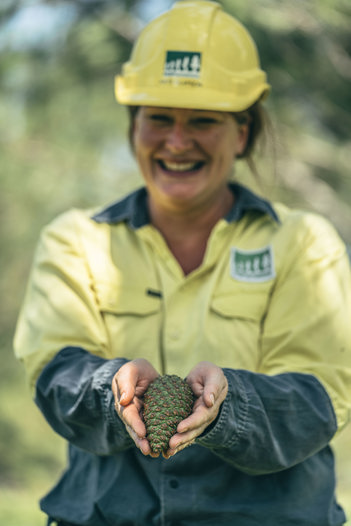Kate Clapson furthering plantation forest science
Celebrating the International Day of Women and Girls in Science 2022 with HQP's Kate Clapson.
 On the International Day of Women and Girls in Science 2022, it seems auspicious that Kate Clapson has worked for HQP and its predecessors for 22 years, having started as a graduate in biotechnology at 22 years old.
On the International Day of Women and Girls in Science 2022, it seems auspicious that Kate Clapson has worked for HQP and its predecessors for 22 years, having started as a graduate in biotechnology at 22 years old.
As our Tree Improvement and Seed Production Coordinator, it’s possible Kate has the longest job title at HQP, and a complex and important role.
Kate leads the implementation of our seed production program in our genetically-improved seed orchards and the long term tree improvement program that provides the foundation for our highest quality Southern Pine and Araucaria plantations.
Kate says she thinks this doesn’t sound very science-y but a lot of science underpins how it is done.
Kate’s work has supported the development and use of a DNA marker chip for tropical pines, which could in future help identify genetically outstanding trees at the seedling stage rather than waiting for field trial measurements. This has the potential to boost the rate of genetic progress in Southern Pine by as much as 50%.
Combining the genomic information with rapid, laser-based measurement of trees from drones and other aircraft will help further accelerate genetic improvement in the years ahead.
“We’re not modifying the DNA, just deploying DNA technology in a highly advanced form of selective breeding through cross pollination,” said Kate.
“It’s exciting that the work I’m doing now is directly related to my Honours research in DNA extraction at university.
Kate’s work contributes directly to the 10 million seedlings we grow each year in our nursery, each one a little carbon capture machine in the making.
“Not only do we care about growing really strong trees, we care about making sure it’s a renewable, sustainable, carbon sequestering resource for the future of QLD,” she says.
Kate encourages young women to consider a career in science and particularly forest management.
There are many things Kate loves about her job. She says her role has offered a lot of family flexibility and she enjoys the variety from fun working in the field to analysing data in the office.
“I’ve been offered a lot of opportunities throughout my career and the most rewarding part about working in forest management been seeing the results of my work realised quickly in an operational setting,” she said.
We think Kate's a great role model for girls and women in science and today we’d like to recognise and congratulate the work of all scientists like Kate who make an invaluable contribution to solving problems around climate change, renewables and carbon capture.





